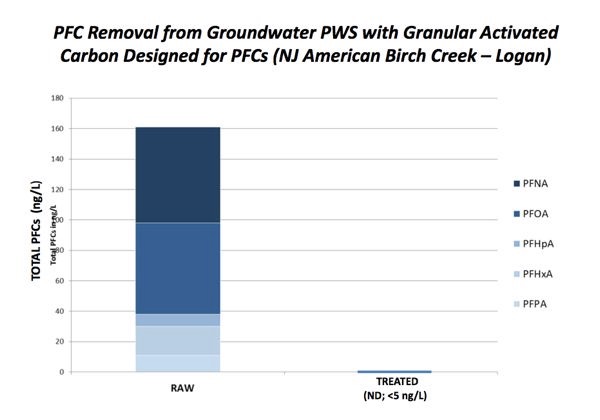A DEP 2014 Report Found Treatment Technology Already Available For PFAS
A Prior 2010 DEP Report Recommended a “Treatment Based Approach” To Remove 500 Unregulated Chemicals Known To Be Present In NJ Drinking Water Supplies
Today NJ Spotlight made a big deal about a bill that would merely require the DEP and Drinking Water Quality Institute (DWQI) to study developing drinking water standards and treatment requirements for “forever chemicals” (PFAS) as a class of compounds, as opposed to individual chemicals.
This study was portrayed as some kind of innovation and “stepping up” the fight against PFAS.
But oops, the study that the bill would require was already conducted by DEP and the DWQI, over a decade ago.
How could Senator Smith not know that DEP conducted the study his new legislation called for a decade ago?
The Spotlight story says that DEP was consulted in developing the bill. So how could the DEP play along and not tell Smith about their prior Reports, one in 2010 and one in 2014?
We’ve testified to the legislature, DEP, and the DWQI about these DEP studies.
We filed a petition for rulemaking to DEP based on these studies, which DEP denied, twice. And we’ve been writing about these issues for well over a decade as well (e.g. see:
We have made Senator Smith, DEP and the DWQI well aware of all these issues.
Here’s my embarrassing letter to Smith and Greenstein, who sponsored the bill:
Dear Chairman Smith and Senator Greenstein:
I learned today of your bill, S3176, that would:
Requires DEP and Drinking Water Quality Institute to perform study concerning regulation and treatment of perfluoroalkyl and polyfluoroalkyl substances.
The core requirements of the bill would direct the DWQI to:
The study shall include an assessment of the feasibility of establishing a maximum contaminant level or other standard for the entire class, or for certain subclasses or mixtures, of perfluoroalkyl and polyfluoroalkyl substances in drinking water, rather than for each individual substance. The study shall also include an assessment of treatment technologies that may be effective in removing perfluoroalkyl and polyfluoroalkyl substances from drinking water or wastewater.
That study was already done.
In April 2014, DEP issued a Final Report: Occurrence of Perfluorinated Chemicals in Untreated New Jersey Drinking Water Sources
https://www.nj.gov/dep/watersupply/pdf/pfc-study.pdf
That DEP Report found:
“PFCs are removed from drinking water by granular activated carbon and reverse osmosis (Rahman et al., 2014), while the standard treatment processes used at the sites included in the 2006 and 2009 studies do not effectively remove PFCs. Data on PFCs in raw and finished water from several sites included in the 2006 and 2009 studies confirms that PFC concentrations are generally not decreased in the finished water (Post et al., 2009, Post et al., 2013b). …In addition, to better understand treatment options available for the removal of unregulated organic contaminants, the Department is studying the effectiveness of granular activated carbon (GAC) removal technology in removing unregulated contaminants, including PFOA and PFOS, in pilot studies at two water systems that use groundwater: Fair Lawn Water Department (Bergen County) and Merchantville-Pennsauken Water Commission (Camden County). These pilot studies are currently ongoing.”
Furthermore, and far more broadly, as you know, over a decade ago, in April 2010, the DEP issued a directly relevant Report titled:
That DEP study recommended a “treatment based approach” as an alternative to individual chemical specific risk assessment based MCLs and treatment requirements.
The DEP Report found that there were over 500 unregulated chemicals present in NJ drinking water supplies; that there was little data on the presence, levels, and human health and ecological risks and effect of those chemicals; that cost effective treatment technology was available to remove those chemicals; and that is was virtually impossible to conduct costly and time consuming individual chemical specific risk assessments and MCLs for each of those 500 chemicals. Above is a link to that DEP Report – here is another:
https://peer.org/wp-content/uploads/attachments/9_7_10_DEP_Treatment_White_Paper.pdf
DEP made these recommendation for exactly the same scientific and regulatory reasons that the bill recommends that PFAS be regulated as a class (as a superior alternative of the current chemical specific risk assessment based MCL’s) and treatment requirements imposed based on a class.
Because we are more than a decade past the study phase and this research has already been done by DEP and the DWQI, as such I request the following amendments:
1) Mandate that DEP adopt a treatment based approach to all unregulated chemicals, in accordance with the prior research studies cited above;
2) Mandate a deadline for adoption of DEP regulations to implement the treatment based approach on all public water supply systems. 12 – 18 months is a reasonable timeframe to do this.
3) delete the study requirements.
Respectfully,
Bill Wolfe


Pingback: WolfeNotes.com » Under the Leadership of Former Exxon Mobil Hack, NJ Audubon Expands Into Climate And Regulation of Toxic Chemicals
Pingback: WolfeNotes.com » An Expanding Pattern Of Greenwashing And Incompetence
Pingback: WolfeNotes.com » “You Were Removed …. The Order Came From Above And I Don’t Know Who Originated It”
Pingback: WolfeNotes.com » Vindication: Office Of Legislative Services Restores Cancelled Account Of Critic
Pingback: WolfeNotes.com » NJ Legislators To Consider A Bill To Ban And Label Certain Products Containing PFAS “Forever Chemicals”